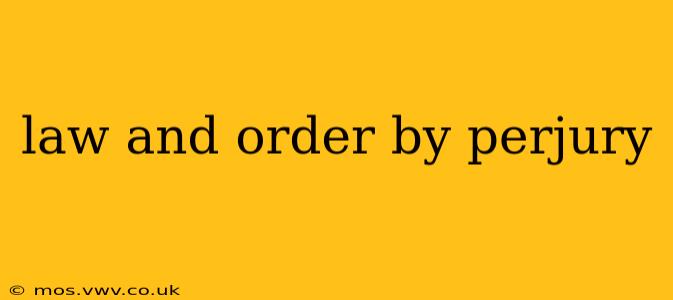Perjury, the act of lying under oath, is a serious offense with significant legal ramifications. This comprehensive guide explores the intricacies of perjury within the context of law and order, addressing common questions and misconceptions surrounding this crime. Understanding the elements of perjury, the penalties involved, and the defenses available is crucial for both legal professionals and the general public.
What is Perjury?
Perjury is the willful giving of false testimony under oath in a judicial proceeding or other official setting. This means the person knowingly made a false statement while under oath, intending to deceive the court or other relevant authority. It's important to note that simply making a mistake or forgetting a detail doesn't constitute perjury; the act must be intentional and deceitful. The statement must also be material, meaning it must relate to a significant aspect of the case or proceeding. A minor, irrelevant falsehood wouldn't typically be considered perjury.
What are the Elements of Perjury?
To successfully prosecute a perjury case, the prosecution must prove several key elements beyond a reasonable doubt:
- A Material False Statement: The statement made must be material to the case or proceeding. This means it must be relevant and could potentially influence the outcome.
- Under Oath: The false statement must have been made under oath or affirmation. This signifies the solemnity of the statement and the understanding that a lie carries legal consequences.
- Knowingly False: The individual must have known the statement to be false at the time it was made. This element is crucial, as it distinguishes perjury from unintentional mistakes or lapses in memory.
- Willful Intent to Deceive: The individual must have intended to deceive the court or other relevant authority with the false statement. This requires demonstrating a conscious decision to lie.
What are the Penalties for Perjury?
The penalties for perjury vary depending on the jurisdiction and the specific circumstances of the case. Generally, however, perjury is a felony offense, punishable by significant fines, imprisonment, and even disbarment for legal professionals. The severity of the punishment often correlates with the gravity of the case in which the perjury occurred. For example, perjury in a high-stakes criminal trial might result in a harsher sentence than perjury in a less significant civil matter.
What are the Defenses Against Perjury Charges?
Several potential defenses exist against perjury charges. These include:
- Lack of Materiality: The defense might argue that the statement made was not material to the case.
- Mistake or Forgetfulness: The defendant might claim they made an honest mistake or simply forgot details, negating the element of knowingly making a false statement.
- Lack of Willful Intent: The defense could argue that the defendant did not intentionally deceive the court. Perhaps they misunderstood a question or were pressured into giving false testimony.
- Inconsistency, not Perjury: A witness's testimony might be inconsistent over time, but that doesn't automatically equate to perjury. The inconsistency must be deliberate and material to constitute the crime.
Can I be charged with perjury for a statement made outside of court?
While perjury typically refers to false statements made under oath in court, some jurisdictions also criminalize similar conduct in other official proceedings, such as sworn affidavits or depositions. The specific rules and penalties will vary according to the relevant laws.
How is Perjury Proved in Court?
Proving perjury often relies on corroborating evidence. This could include:
- Contradictory Evidence: Evidence that directly contradicts the defendant's sworn testimony.
- Witness Testimony: Testimony from other witnesses who can attest to the falsity of the defendant's statements.
- Documentary Evidence: Documents or records that demonstrate the defendant's statements were false.
What is the difference between perjury and false swearing?
While both involve making false statements, perjury specifically relates to statements made under oath in a judicial proceeding, while false swearing encompasses false statements made under oath in other official contexts, like a notary public.
This information is for educational purposes only and should not be considered legal advice. If you are facing perjury charges, you should consult with a qualified legal professional immediately.
